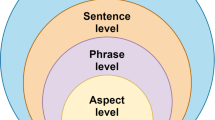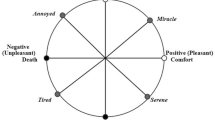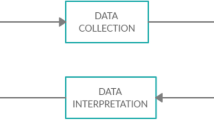Abstract
As the main carrier and platform of spreading network public opinion, micro-blog makes information disseminate more quickly and the influence of public opinion increased. Therefore, accurate analysis and prediction of micro-blog emotion are of great significance for predicting and controlling public opinion. In this paper, we propose the emotional component analysis and public opinion forecast on Chinese micro-blog posts based on maximum entropy model, which uses fine-grained to classify emotion of Chinese micro-blog. Firstly, we preprocess the Chinese micro-blog to filter the noise data. Moreover, the document frequency method and information gain principle are combined to extract features. Secondly, the maximum entropy model is employed to train classifier, and the selective integrated classifiers are used to analyze emotion. On this basis, the principle of the minority subordinate to the majority is used to predict public opinion. In addition, the experimental results have shown the accuracy of the proposed algorithm is 0.88, and the comparison of the four indicators of accuracy, recall, F-Measure and convergence error verify the feasibility and effectiveness of the proposed method.






Similar content being viewed by others
References
On-At, S., Canut, M. F., Péninou, A., et al: Deriving user’s profile from sparse egocentric networks: Using snowball sampling and link prediction. In: Proceedings of the IEEE Ninth International Conference on Digital Information Management, pp. 80–85, (2014)
Sun, X., Li, C., Ye, J.: Chinese microblogging emotion classification based on support vector machine. In: Proceedings of the IEEE International Conference on Computing, Communication and NETWORKING Technologies, pp. 1–5, (2014)
Jiang, D., Luo, X., Xuan, J., Xu, Z.: Sentiment computing for the news event based on the social media big data. IEEE Access 5, 2373–2382 (2017)
Argueta, C., Saravia, E., Chen, Y. S.: Unsupervised graph-based patterns extraction for emotion classification. In: Proceedings of the IEEE/ACM International Conference on Advances in Social Networks Analysis and Mining, pp. 336–341, (2015)
Becker, K., Moreira, V.P., Santos, A.G.L.D.: Multilingual emotion classification using supervised learning: comparative experiments. Inf. Process. Manage. 53(3), 684–704 (2017)
Niu, Z., Yin, Z., Kong, X.: Sentiment classification for microblog by machine learning. In: Proceedings of the IEEE Fourth International Conference on Computational and Information Sciences, pp. 286–289, (2012)
Moraes, R., Valiati, J.F., Neto, W.P.G.: Document-level sentiment classification: an empirical comparison between SVM and ANN. Expert Syst. Appl. 40(2), 621–633 (2013)
Xu, L.: Constructing the affective lexicon ontology. J. China Soc. Sci. Tech. Inf. 27(2), 180–185 (2008)
Chen, B., Hao, Z., Cai, R., et al.: Sentiment target extraction based on CRFs with multi-features for Chinese microblog, web technologies and applications. Springer, Berlin (2016)
Zhai, Z., Xu, H., Kang, B., et al.: Exploiting effective features for Chinese sentiment classification. Expert Syst. Appl. 38(8), 9139–9146 (2011)
Gao, K., Xu, H., Wang, J.: A rule-based approach to emotion cause detection for Chinese micro-blogs. Pergamon Press Inc, Oxford (2015)
Chen, N. Y., Liu,Y., Zhang, Z. J.: A forecasting system of micro-blog public opinion based on artificial neural network. In: Proceedings of the IEEE Tenth International Conference on Intelligent Information Hiding and Multimedia Signal Processing, pp. 999–1004, (2014)
Wang, X., Zhang, H., Xu, Z.: Public sentiments analysis based on fuzzy logic for text. Int. J. Softw. Eng. Knowl. Eng. 26(9–10), 1341–1360 (2016)
Xu, L.: The Application of gray model and support vector machine in the forecast of online public opinion. Int. J. Online Eng. 9((S2)), 31–34 (2013)
Song, L., Wu, H., Zhang, Z.: Support vector machine prediction model based on chaos theory. Int. J. Multimed. Ubiquitous Eng. 11(2), 173–184 (2016)
Tian, Y., Yuan, W., Shao, L.: Online public opinion risk warning based on bayesian network modeling, Library & Information Service, 2012
Bu, Z., Li, H., Cao, J., et al.: Game theory based emotional evolution analysis for chinese online reviews. Knowl.-Based Syst. 103, 60–72 (2016)
Xu, H., Yang, W., Wang, J.: Hierarchical emotion classification and emotion component analysis on chinese micro-blog posts. Expert Syst. Appl. 42(22), 8745–8752 (2015)
Frolov, A.A., Húsek, D., Polyakov, P.Y.: Comparison of seven methods for boolean factor analysis and their evaluation by information gain. IEEE Transact. Neural Netw. Learn. Syst. 27(3), 538–550 (2016)
Carli, F.P., Chen, T., Ljung, L.: Maximum entropy kernels for system identification. IEEE Transact. Autom. Control 62(3), 1471–1477 (2017)
Ni, T., Gu, X., Wang, S., et al.: Locality preserving semi-supervised support vector machine. J. Inf. Sci. Eng. 31(6), 2009–2024 (2015)
Acknowledgements
This work is partially supported by the National Natural Science Foundation of China (NSFC) under Grants Nos. 61602155, 61370221 and U1604155, in part by the Program for Science & Technology Innovation Talents in the University of Henan Province under Grants No. 16HASTIT035, and in part by Henan Science and Technology Innovation Project under Grant Nos. 164200510007 and 174100510010, and in part by the Industry university research project of Henan Province under Grant No. 172107000005, and in part by the Program for Innovative Research Team in University of Henan Province under Grants No. 17IRTSTHN010, and in part by the support program for young backbone teachers in Henan Province under Grant no. 2015GGJS-047.
Author information
Authors and Affiliations
Corresponding authors
Ethics declarations
Conflict of interest
The authors declare that there is no conflict of interests regarding the publication of this paper.
Rights and permissions
About this article
Cite this article
Zhang, M., Zheng, R., Chen, J. et al. Emotional component analysis and forecast public opinion on micro-blog posts based on maximum entropy model. Cluster Comput 22 (Suppl 3), 6295–6304 (2019). https://doi.org/10.1007/s10586-018-1993-6
Received:
Revised:
Accepted:
Published:
Issue Date:
DOI: https://doi.org/10.1007/s10586-018-1993-6




